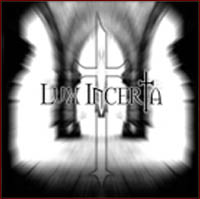LUX INCERTA (FRA) - Démo (2004)

Label : Auto-Production
Sortie du Scud : 2004
Pays : France
Genre : Doom/Goth Metal
Type : Démo
Playtime : 4 Titres - 20 Mins
Dès les première secondes LUX INCERTA nous plonge dans une mélancolie qui imprègne l’ensemble de cette démo. Il ne s’agit pas de ces sentiments faciles dans lesquels certains groupes de Goth amateurs se vautrent volontiers, on a l’impression que les parisiens ont des émotions complexes à partager et qu’ils extériorisent là un trop plein. Cette apparente sincérité donne aux compositions une profondeur qui fait souvent défaut. En outre, la formation parisienne ne se contente pas d’appliquer une formule à succès, elle écrit sa musique en suivant différentes pistes, en particulier le Gothique et le Doom. Ce n’est pas toujours complètement original mais ça a le mérite d’être efficace et bien fait. Que demander de mieux ?
“Clear Water” commence avec un chant clair et une douce mélodie qui nous fait craindre le pire, mais il s’agit d’une entrée en matière afin de nous plonger délicatement dans l’univers artistique du groupe.
“The Monk” est incontestablement le meilleur morceau de cette démo et vaut à lui seul le détour.
“Miserabilis...” est une complainte de 2 minutes, assez poignante, mais qui aurait davantage sa place sur un album. Elle sert d’intro au titre suivant.
On retrouve le Doom Metal sur “...Miserabile” qui marie adroitement les atmosphères ; mélange de puissance et de nostalgie. Les chants grégoriens qui accompagnent subtilement les riffs donnent à ce titre un intérêt tout particulier.
La production n’est pas à mettre du côté des défauts car elle n’a pas grand chose à envier aux albums signés. Par contre Agone, le chanteur, est assez maladroit avec l’anglais.
Ajouté : Vendredi 22 Avril 2005
Chroniqueur : Alexis de Fireball
Score :    
Lien en relation: Lux Incerta Website
Hits: 15819
|













